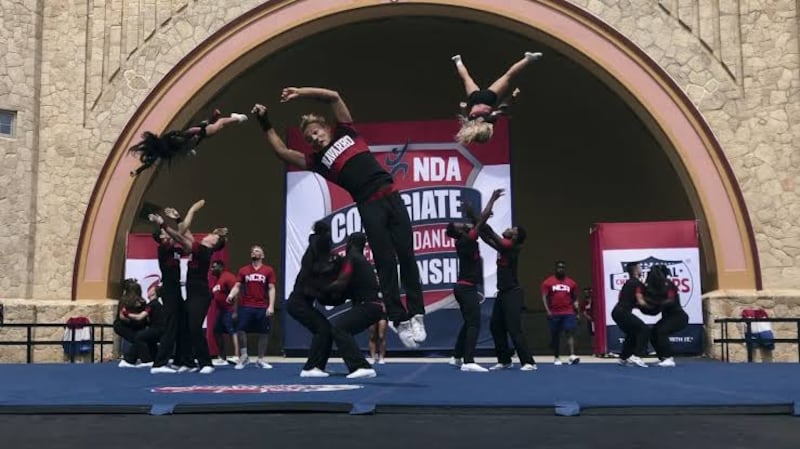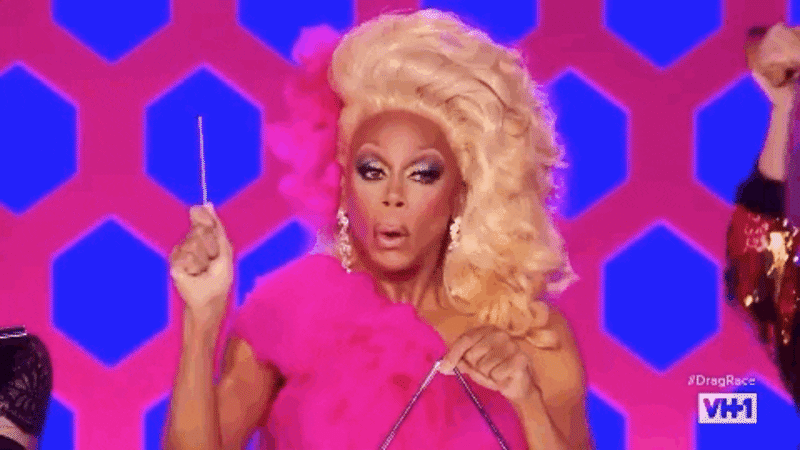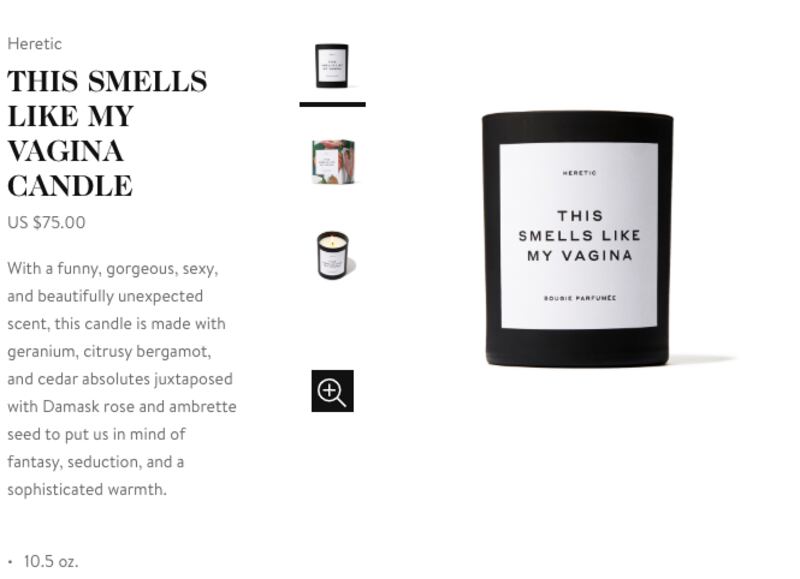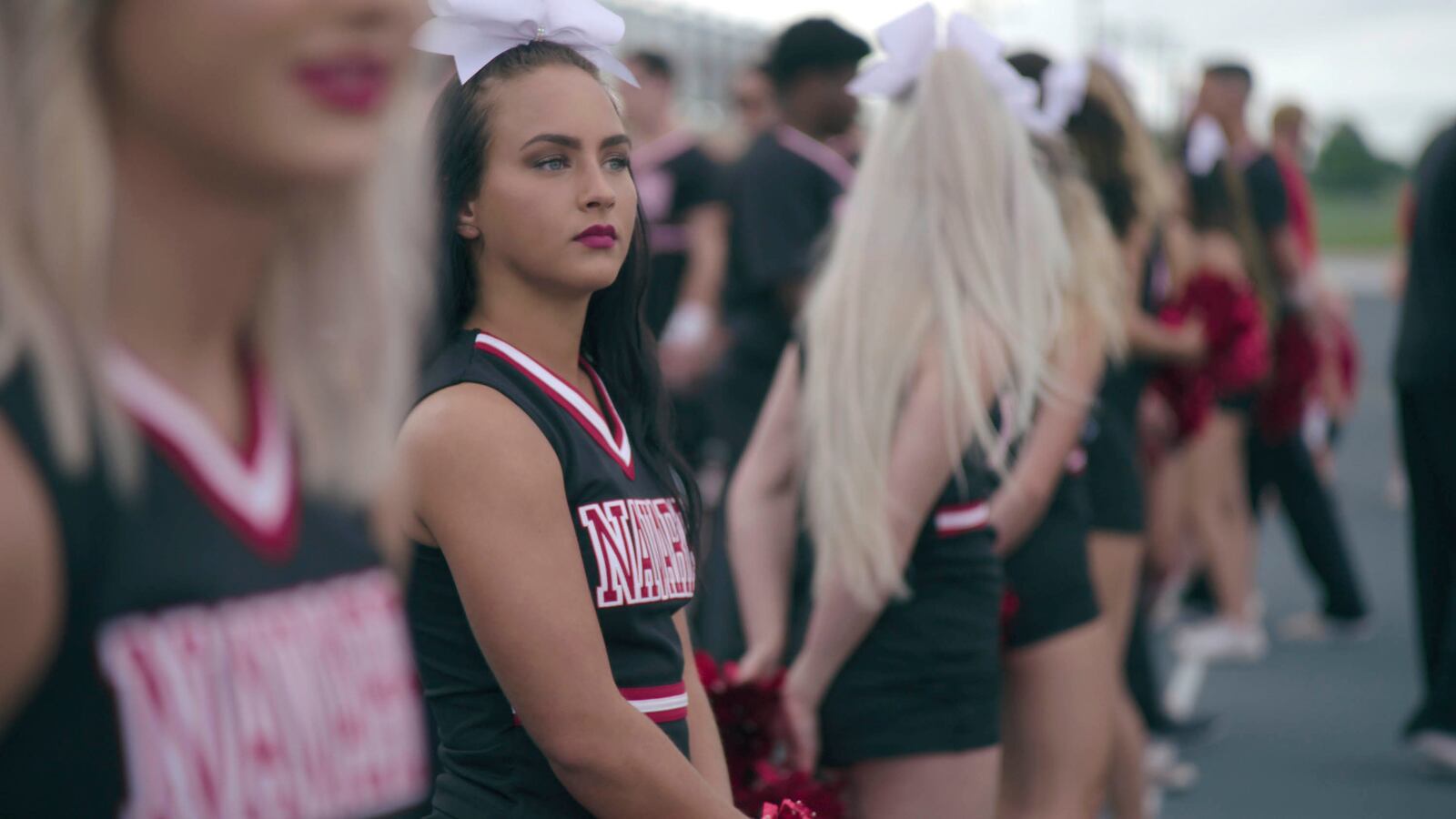This is a preview of our pop culture newsletter The Daily Beast’s Obsessed, written by senior entertainment reporter Kevin Fallon. To receive the full newsletter in your inbox each week, sign up for it here.
This week:
- Grappling with Brad & Jen feelings.
- Grappling with Cheer feelings.
- Grappling with RuPaul feelings.
- Grappling with Applebee’s feelings.
- Grappling with Goop.
My heart has still not recovered from binge-watching Cheer on Netflix, a series that had my nerves fried to the point they were giving off smoke. I gasped 20 to 30 times an episode watching the young cheer squad of Navarro College practice high-flying stunts, as if gravity was merely a construct and 95-pound girls in sports bras might actually bounce after plummeting from the top of a tower of human bodies.
It is negligence of the gravest degree that Netflix doesn’t prescribe blood pressure medication to any subscriber who watches.
Cheer arrived with a herkie and a smile in the zeitgeist this month, partly because the show is perfectly manufactured for bingeing and partly because it is January and this is a Netflix show, so what the hell else are we all going to do anyway?
At the center of the series is real-life manifestation of Friday Night Lights’ Tami Taylor, Monica Aldama, a spitfire cheerleading coach in the dusty town of Corsicana, Texas, where she has led a squad of spunky junior college students to 14 national championships in 19 years, while filling the role of surrogate mother along the way. As the Cheer obsession cycle tumbles on, Aldama’s become more of a polarizing figure.
On the one hand, she’s the perfect reality series protagonist: a whip-smart woman changing lives in a small town, embodying all the “values” we ascribe to domineering athletic coaches. Reese Witherspoon cried while talking about her. My boyfriend and I spent 45 minutes discussing her style. On the other hand, she’s a domineering athletic coach. That’s...not a good thing.
It’s on this point that Cheer represents everything that’s great and everything that’s awful about reality television, or docuseries television, or however you want to describe this show.

Subjects are carefully chosen. There’s Morgan, the dynamo assemblage of muscle hot glued onto a skeletal structure, whose parents abandoned her and who would do anything to appease Coach Monica. There’s Jerry, a heavier black gay man whose ever-present joy makes his heartache more poignant: his mother died of cancer.
There are sob stories and triumphs—would you believe that, for nearly every member of the squad, it is cheerleading that actually saved them?—which ensure that emotions are flipping and spinning as high and as fast as the kids on the mat.
But a series is just as often defined by what it doesn’t show as much as what it does. It gets increasingly bizarre, as you follow these teens and twentysomethings for months, that there’s no mention of their personal lives. What they accomplish as a team is astonishing. It’s also incredibly concerning, something that in the pursuit of landing every narrative cliche with a champion’s precision, the show ignores.
As Amanda Mull wrote in a piece for The Atlantic that was widely circulated this week, “Instead, the series tells one of the oldest, darkest stories in American sports—of athletes with no pay and little support breaking their bodies again and again, all for the greater glory of an authority figure they dare not question.”
There are several aggravating things when it comes to what Cheer illuminates about the sport it’s documenting.
At the forefront is the systemic sexism that dooms these athletes once they’re at the top of the game. It is one of the only team sports I can think of where, after years of training and grueling taxing of the body, there is no professional outlet once college competition ends. What these people are doing is no dance-team routine you might see at an NFL game. It is athleticism of the highest caliber, achievement that is then entirely dismissed because of gendered ideas of what has value in the sports world.
Then there’s the fact that we get so seduced by narratives like these—scrappy kids who put their blood, sweat, and tears on the mat to appease their savior coach—that we ignore the fact that we may be complicit in perpetuating a justification of abuse in pursuit of arbitrary athletic glory. Hard work is an incredible thing. But when did it get fetishized to the point that blood, sweat, and tears stopped meaning...blood, sweat, and tears?
Is that a reason not to watch Cheer? It’s certainly something to consider while you do. In any case, I’ve been shamed by the show into doing situps in the living room for the rest of my life while you decide.
RuPaul will host Saturday Night Live on February 8. Forget what you may think about the NBC sketch show and its quality this season, this is very exciting! For one, it’s extremely rare for a celebrity most known for television to be invited to host. For another, it’s rarer for that celebrity to be, uh, a drag queen.

When Kristen Stewart hosted the show earlier this TV season, it was the first time the show had an openly queer host since the last time Stewart hosted, in February 2017. The last openly gay man to host was Jim Parsons in 2014. That’s a long time. Especially when hiring RuPaul to host the show, something the entertainer has been campaigning to do for years, is such a no brainer.
But that’s so often the case when it comes to LGBTQ representation in entertainment. We’re meant to be ecstatic for earning the obvious. Give us a crumb, we’ll make a cake. Or, in this case, give us a late-night platform, and we’ll slay the runway.
This week, I saw a commercial for Applebee’s advertising unlimited chicken wings while Britney Spears’ “...Baby One More Time” played in the background. This follows previous commercials in which fried appetizers were shot in porn-like fashion while Celine Dion’s “It’s All Coming Back to Me Now” and, in another, Dolly Parton’s “Here You Come Again” played.

What I’m saying is think my entire identity is an Applebee’s commercial.

Gwyneth Paltrow’s Goop website recently made available for purchase a $75 candle called “This Smells Like My Vagina.” Talking about it this week on Late Night With Seth Meyers, she called the candle “a little bit punk rock.” You know what? Sure.
Miracle Workers: Dark Ages: Daniel Radcliffe and Steve Buscemi: Funny guys!
Shrill: Aidy Bryant is a goddamn star.
The Goop Lab: I mean, you’re curious, right?
What to skip this week:
The Gentlemen: Interesting white guy cast. Meh.
The Last Full Measure: Interesting white guy cast. Meh.
The Goop Lab: I mean, are you insane?






